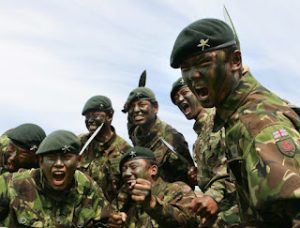In an article in The Diplomat at the start of the Russian invasion of Ukraine in February 2022, I wrote that the conflict would have “hardly any direct impact” on my country, Nepal. I could not have been more wrong.
Nepal is directly entangled in the war. Not only have many Nepali citizens gone to Russia to join the Russian Army, but also several have died fighting on the frontlines.
The estimates of the number of Nepali citizens in the Russian military vary widely. Nepal’s Foreign Minister Narayan Prasad Saud estimated that around 200 Nepalis were serving in the Russian Army towards the end of 2023. The government had received complaints from around 200 families regarding their kin being injured or missing in war. Fourteen citizens are confirmed to have died in the war zone so far.
On the other hand, a recent CNN report, based on testimony from men returning from the war zone, estimated that the number could be as high as 15,000. However, it provides no further evidence to back up the number. Nepali journalists closely following the issue estimate the number to be above 500.
What is driving Nepali nationals to fight in Russia’s war on Ukraine?
On their own volition and against government restrictions, Nepali citizens are heading to Russia on a tourist visa or through third countries to participate in the war as mercenaries. The lack of economic opportunities at home and the lure of big payments in Russia have attracted Nepalis. Therefore, the youths have risked their lives in hopes of better earnings and gaining citizenship/permanent residence in developed countries. Unless the prospects improve in the home country, government restrictions will unlikely stem the flow of young men to war zones.
This dynamic has thrust Nepal into the middle of the Russia-Ukraine war.
Nepal has a tripartite agreement with Britain and India to allow for the recruitment of its citizens in the Gurkha regiments of their militaries. Britain also recruits Nepali citizens specifically to deploy in Singapore and Brunei. It is a proud tradition, and Nepali recruits are recognized as among the most loyal and brave soldiers. Though no agreement exists with other countries, Nepali citizens have joined the U.S. and French militaries as well.
Sam Manekshaw, former Indian field marshal, once effusively quipped, “If a man says he is not afraid of dying, he is either lying or is a Gurkha.” The Gurkha lahures, as they were affectionately called, commanded respect and had a special place in Nepali society and culture.
Nepali citizens found ways to serve as security guards or service staff to the American and coalition forces during their missions in Afghanistan and Iraq too, despite Nepal banning travel to those countries for work.
Additionally, Nepal is currently the largest troop-contributing nation in the United Nations Peacekeeping Operations (UNPKO). By November 2023, Nepal had deployed 6,247 troops for the UNPKO, leapfrogging Bangladesh to take the top spot. Nepal takes pride in its contribution to global peace via the UNPKO.
However, there is a critical difference between those who join the Indian Army, British Army, or the UNPKOs and those who join the battlefield frontlines in Russia with little to no training. In the case of the latter, Nepali citizens are being used as dispensable and cheap mercenary forces.
The impact on Nepal’s foreign policy has been immediate and real.
Nepal has sent multiple diplomatic notes and summoned the Russian ambassador to Nepal. Nepal has urged Moscow to stop recruiting Nepali citizens and repatriate those deployed in the war. Russia has quietly ignored the messages. Nepal’s government belatedly busted a network of influential people involved in trafficking Nepalis to join the Russian Army. Kathmandu negotiated with Moscow to provide compensation to the families of Nepalis killed during the war through the Nepali Embassy in Moscow.
Nevertheless, the sentiment within the political and bureaucratic circles is apathy and disinterest. Nepali officials “knew that Nepalis were going to Russia even via various Gulf states” and yet did not respond immediately.
The impact has still been limited because Ukraine is of tertiary interest to Nepal. Imagine the scenario if a similar number of Nepalis were fighting for Ukraine! It would have jeopardized Nepal-Russia relations.
Such a scenario also adds to the concerns of the Agnipath scheme, a four-year recruitment scheme of the Indian Army, after which only one-fourth of those recruited will continue to be employed in the military. Before the Agnipath scheme, India recruited around 1,400 Gurkhas annually from Nepal. Nepal has halted recruitment after India introduced the Agnipath scheme. Had it continued, the recruitment would have gone up, but three-quarters of the soldiers would have been released after four years in service. That means that Nepal would have thousands of unemployed former Indian Army recruits of 21-27 years of age, with excellent training.
Russia would have salivated at a chance to recruit such professionals.
As stated earlier, the push and pull factors of Nepalis going to war zones like Russia are so strong that the government restriction has not had the intended effect. As such, Kathmandu could seek to regulate such recruits by opening talks with other friendly countries. This could pave the way for the Nepali government to negotiate the conditions of recruitment, and the recruiting countries would treat Nepali soldiers with respect and not as cheap, dispensable mercenaries.
That would be a big change in Nepal’s foreign policy orientation. So far, Nepal allows for such recruitment for India and Britain. Doing so would open the doors of other nations’ militaries to recruit Nepali citizens and would further expand Nepal’s image as the “land of Gurkhas.”
It would enmesh Nepal further into the security issues of such friendly nations. However, it would be economically and diplomatically more prudent than individual citizens going to war zones illegally while the government seems apathetic to the plight of its nationals.

































